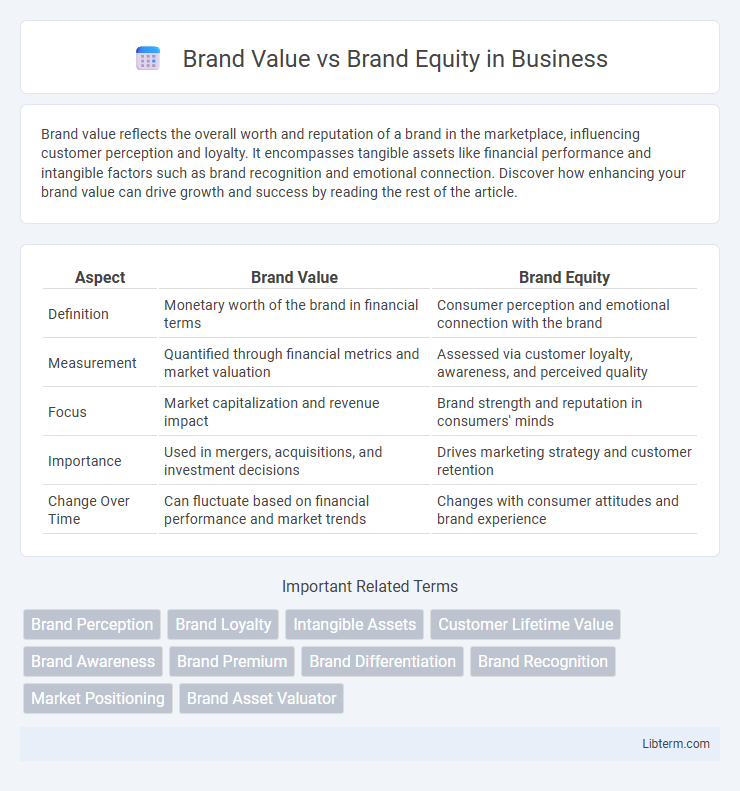Brand value reflects the overall worth and reputation of a brand in the marketplace, influencing customer perception and loyalty. It encompasses tangible assets like financial performance and intangible factors such as brand recognition and emotional connection. Discover how enhancing your brand value can drive growth and success by reading the rest of the article.
Table of Comparison
| Aspect | Brand Value | Brand Equity |
|---|---|---|
| Definition | Monetary worth of the brand in financial terms | Consumer perception and emotional connection with the brand |
| Measurement | Quantified through financial metrics and market valuation | Assessed via customer loyalty, awareness, and perceived quality |
| Focus | Market capitalization and revenue impact | Brand strength and reputation in consumers' minds |
| Importance | Used in mergers, acquisitions, and investment decisions | Drives marketing strategy and customer retention |
| Change Over Time | Can fluctuate based on financial performance and market trends | Changes with consumer attitudes and brand experience |
Understanding Brand Value: Definition and Importance
Brand value refers to the financial worth of a brand, representing the monetary estimation based on market demand, competitive advantage, and revenue potential. It plays a crucial role in attracting investors, influencing stock prices, and guiding strategic business decisions by quantifying a brand's tangible impact on company valuation. Understanding brand value helps companies measure their market position and leverage brand strength to drive long-term profitability and growth.
What is Brand Equity? Key Concepts Explained
Brand equity refers to the intrinsic value a brand adds to a product or service, influenced by consumer perceptions, experiences, and loyalty. Key concepts include brand awareness, perceived quality, brand associations, and brand loyalty, which collectively enhance a brand's competitive advantage and customer preference. Strong brand equity leads to increased market share, premium pricing, and reduced marketing costs by fostering trust and emotional connections with consumers.
Brand Value vs Brand Equity: Core Differences
Brand value refers to the monetary worth of a brand in the market, reflecting its financial performance and potential revenue generation. Brand equity encompasses the consumer perceptions, loyalty, and emotional connections that influence a brand's strength and competitive advantage. Core differences lie in brand value quantifying economic impact, while brand equity measures intangible customer-based assets driving long-term brand success.
Measuring Brand Value: Methods and Metrics
Measuring brand value involves quantitative methods such as the discounted cash flow (DCF) analysis, which estimates future revenue attributable to the brand, and market-based approaches like brand price premium, assessing price differences due to brand strength. Metrics such as brand valuation reports from firms like Interbrand and Brand Finance incorporate financial performance, brand loyalty, and market share to determine brand value. Brand equity measurement focuses on consumer perception metrics, including brand awareness, perceived quality, and brand associations, often gathered through surveys and brand tracking studies.
Evaluating Brand Equity: Tools and Indicators
Evaluating brand equity involves measuring customer perceptions, brand loyalty, and financial performance using tools such as the Brand Equity Ten model, which assesses brand awareness, perceived quality, and brand associations. Key indicators include Net Promoter Score (NPS) for customer loyalty, brand recall metrics, and market share analysis to quantify brand strength. Financial techniques like royalty relief method and brand valuation models provide monetary estimates reflecting the brand's contribution to overall business value.
Factors Influencing Brand Value
Brand value is primarily influenced by tangible factors such as financial performance, market share, and revenue generation, reflecting a company's monetary worth. Brand equity depends on intangible elements like customer loyalty, brand awareness, perceived quality, and brand associations that drive consumer preference and long-term competitive advantage. Key influencers of brand value include strong marketing strategies, consistent brand messaging, product innovation, and positive customer experiences that enhance overall brand perception and financial standing.
Elements that Shape Brand Equity
Brand equity is shaped by key elements such as brand awareness, perceived quality, brand associations, and brand loyalty, which collectively influence consumer perceptions and behaviors. These components build the foundation for a brand's ability to command premium pricing and foster customer retention. Unlike brand value, which quantifies the financial worth of a brand, brand equity emphasizes intangible attributes derived from consumer experiences and brand reputation.
The Impact of Brand Value on Business Performance
Brand value directly influences business performance by enhancing market positioning, customer loyalty, and pricing power, leading to increased revenue and profitability. Companies with strong brand value often experience higher stock market valuations and greater competitive advantage in their industry. This asset contributes to long-term sustainable growth by fostering consumer trust and enabling premium pricing strategies.
Building and Sustaining Strong Brand Equity
Building strong brand equity involves creating positive customer perceptions through consistent quality, effective marketing, and emotional connections, which increase brand loyalty and command premium pricing. Sustaining brand equity requires ongoing brand management, innovation, and delivering on brand promises to maintain trust and relevance in competitive markets. Measuring brand equity through customer-based metrics and financial performance helps guide strategic investments that enhance long-term brand value.
Strategic Implications: Leveraging Brand Value and Equity
Strategic implications of leveraging brand value and equity involve maximizing customer loyalty, enhancing market positioning, and driving sustainable revenue growth. Brand equity provides measurable assets such as brand recognition and perceived quality, which inform targeted marketing strategies and premium pricing models. Strong brand value enables companies to negotiate better partnerships, increase shareholder confidence, and expand into new markets with reduced risk.
Brand Value Infographic

 libterm.com
libterm.com